#too much history
Text
yall, it’s begun: just saw a semi-negative review of babel where the reviewer’s problem is that the book is too academic
#they said that this dark academia book is too academic yall#too much history#wish i was making it up#like lmfao#babel#babel an arcane history#dark academia#rf kuang
43 notes
·
View notes
Text
its so crazy that for the last 5 years a small but annoyingly vocal online group has been acting like mob movies of all things are pretentious and inaccessible cinema. yeah the godfather is kinda slow but these are movies about criminals who shoot people
#that family guy bit is right it does insist upon itself but it has a valid point to insist etc etc#crow.txt#side note if you do wanna watch a good mob flick and the godfather was a bit too slow for you please watch goodfellas#its one of my favorite films of all time i love it so much#while i do like the godfather and i recognize how important it was for film history i like goodfellas a bit more
3K notes
·
View notes
Text


Back at it with my enchanted merthur shenanigans
#when Merlin goes to work#(I am undecided on what he does but I think he does have a job (probably a librarian I’d that’s not TOO cliche…))#he sets Arthur up with a bunch of history books and documentaries to try get him up to date (as much as he can)#and in the evenings they watch all Merlin’s favourite tv shows and movies#I can’t pick what kinds of movies Merlin and Arthur like#I get the feeling they both like pride and prejudice but I’m also biased#I think Arthur would like murder mysteries#ALSO If anyone’s got any fics where Merlin introduces Arthur to modern society please please PLEASE GIVE THEM TO ME#my art#bbc merlin#merlin#merlin emrys#arthur pendragon#merthur
3K notes
·
View notes
Text
they want to talk about mental illness and acceptance and how everyone is a little ocd it's cute and quirky and their "intrusive thoughts" are about cutting their hair off and you say yours are about taking a razorblade to your eye and they say ew can you not and everyone is a little adhd sometimes! except if you're late it's a personality flaw and it's because you are careless and cruel (and someone else with adhd mentions they can be on time, so why can't you?) and it's not an eating disorder if it's girl dinner! it's not mania if it's girl math! what do you mean you blew all of your savings on nonrefundable plane tickets for a plane you didn't even end up taking. what do you mean that you are afraid of eating. get over it. they roll their little lips up into a sneer. can you not, like, trauma dump?
they love it on them they like to wear pieces of your suffering like jewels so that it hangs off their tongue in rapiers. they are allowed to arm-chair diagnose and cherrypick their poisons but you can't ever miss too many showers because that's, like, "fuckken gross?" so anyone mean is a narcissist. so anyone with visual tics is clearly faking it and is so cringe. but they get to scream and hit customer service employees because well, i got overwhelmed.
you keep seeing these posts about how people pleasers are "inherently manipulative" and how it's totally unfair behavior. but you are a people pleaser, you have an ingrained fawn response. in the comments, you have typed and deleted the words just because it is technically true does not make it an empathetic or kind reading of the reaction about one million times. it is technically accurate, after all. you think of catholic guilt, how sometimes you feel bad when doing a good deed because the sense of pride you get from acting kind - that pride is a sin. the word "manipulation" is not without bias or stigma attached to it. many people with the fawn response are direct victims of someone who was malignantly manipulative. calling the victims manipulative too is an unfair and unkind reading of the situation. it would be better and more empathetic to say it is safety-seeking or connection-seeking behavior. yes, it can be toxic. no, in general it is not intended to be toxic. there is no reason to make mentally ill people feel worse for what we undergo.
you type why is everyone so quick to turn on someone showing clear signs of trauma but you already know the fucking answer, so what's the point of bothering. you kind of hate those this is what anxiety looks like! infographics because at this point you're so good at white-knuckling through a severe panic attack that people just think you're stoic. even people who know the situation sometimes comment you just don't seem depressed. and you're not a 9 year old white kid so there's no way you're on the spectrum, you're not obsessed with trains and you were never a good mathematician. okay then.
mental illness is trending. in 2012 tumblr said don't romanticize our symptoms but to be fair tiktok didn't exist yet. there's these series of videos where someone pretends to be "the most boring person on earth" and is just being a normal fucking person, which makes your skin crawl, because that probably means you are boring. your friend reads aloud a profile from tinder - no depressed bitches i fucking hate that mental illness crap. your father says that medication never actually works.
you still haven't told your grandmother that you're in therapy. despite everything (and the fact it's helping): you just don't want her to see you differently.
#writeblr#warm up#to be clear let me state again: i think you should id however you fucking want if it helps you seek peace#but there is a HUGE difference between being like '.... im undiagnosed but i think i might be X'#and a person who is like ''omg my intrusive thoughts made me buy a birkin!!!''#babe mine made me throw up bc they disgusted me so much <3#mine made me hurt myself evenly. even when i wanted to stop. i have had to put my hand on the stove MULTIPLE TIMES#and again i'd rather have 10000 people get help for something they don't need help for#than have 1 kid NOT get help#but there has GOTTTTT to be a middle ground here#bc at this point it isn't ''raising awareness''#it's . fucking misinformation. and ''what this picture says about you!!!!!''#& yes! im mostly talkin about ppl who are actually disgusted and offended by signs of mental illness#but use it to defend THEIR actions#like babe you hate when kids start yelling in the walmart? but you YOuRSELF can yell?#you are depressed so it's fine you were cruel to your spouse?#but if your spouse spends too much time in bed she's a lazy fuck?#your partner needs to do everything for you bc of your history in trauma? but when SHE has needs she's being clingy and gross?#HUGE difference here between whom i think most of my followers are btw. like#all it takes is fucking anyyyy empathy or kindness . like.#anyway it's hard to explain im hoping we all know the person im talking about lol
6K notes
·
View notes
Quote
Grief will keep you reaching back / for what is not there
Adrianne Kalfopoulou, “Poem in Pieces, a Log,” A History of Too Much
#quotes#adrianne kalfopoulou#poem in pieces#a history of too much#poetry#prose#grief#on grief#nostalgia#text#1K#5K#10K
14K notes
·
View notes
Text

when you come home
#myartsystuff#character design#dungeons and dragons#oc: kaz#artists on tumblr#illustration#kaz is learning too much about his history and people lately (and its BAD)#so he gets to have some time picking flowers in a nice open field for his health
1K notes
·
View notes
Text
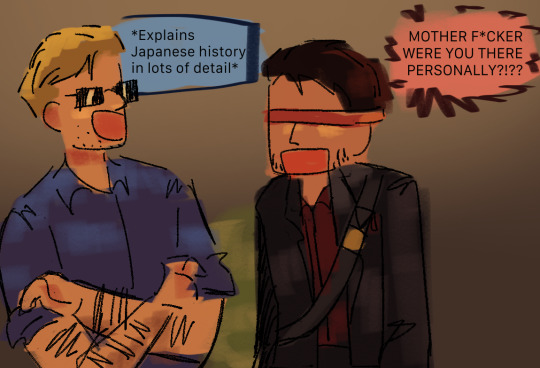
Headcanon Johnny is a history nerd
#Mortal Kombat#Johny Cage#kenshi takahashi#You see Kenshi knows as much japanese history too but he felt like he failed sento when he hears Johnny infodumping 😭😭😭#Johnshi
2K notes
·
View notes
Photo
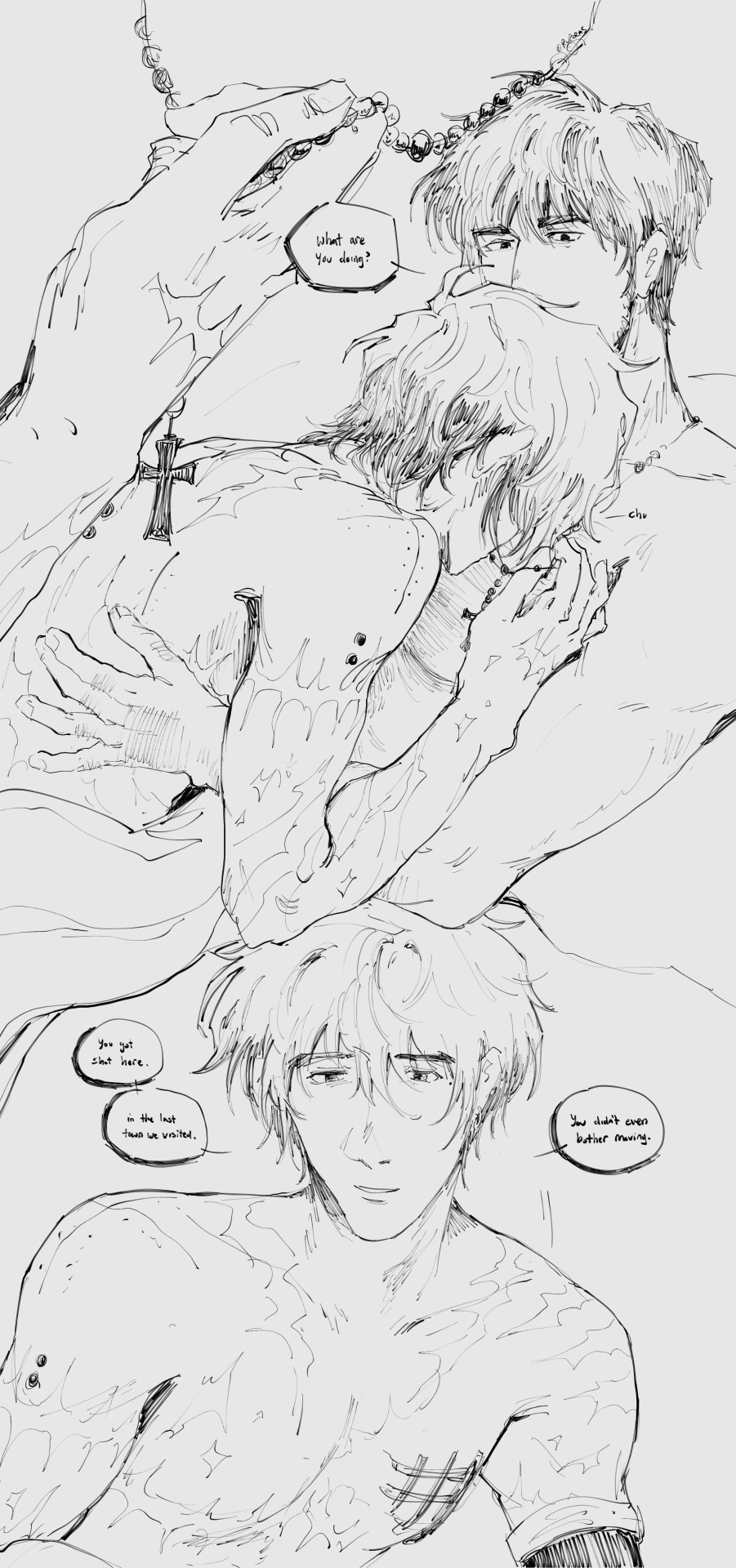


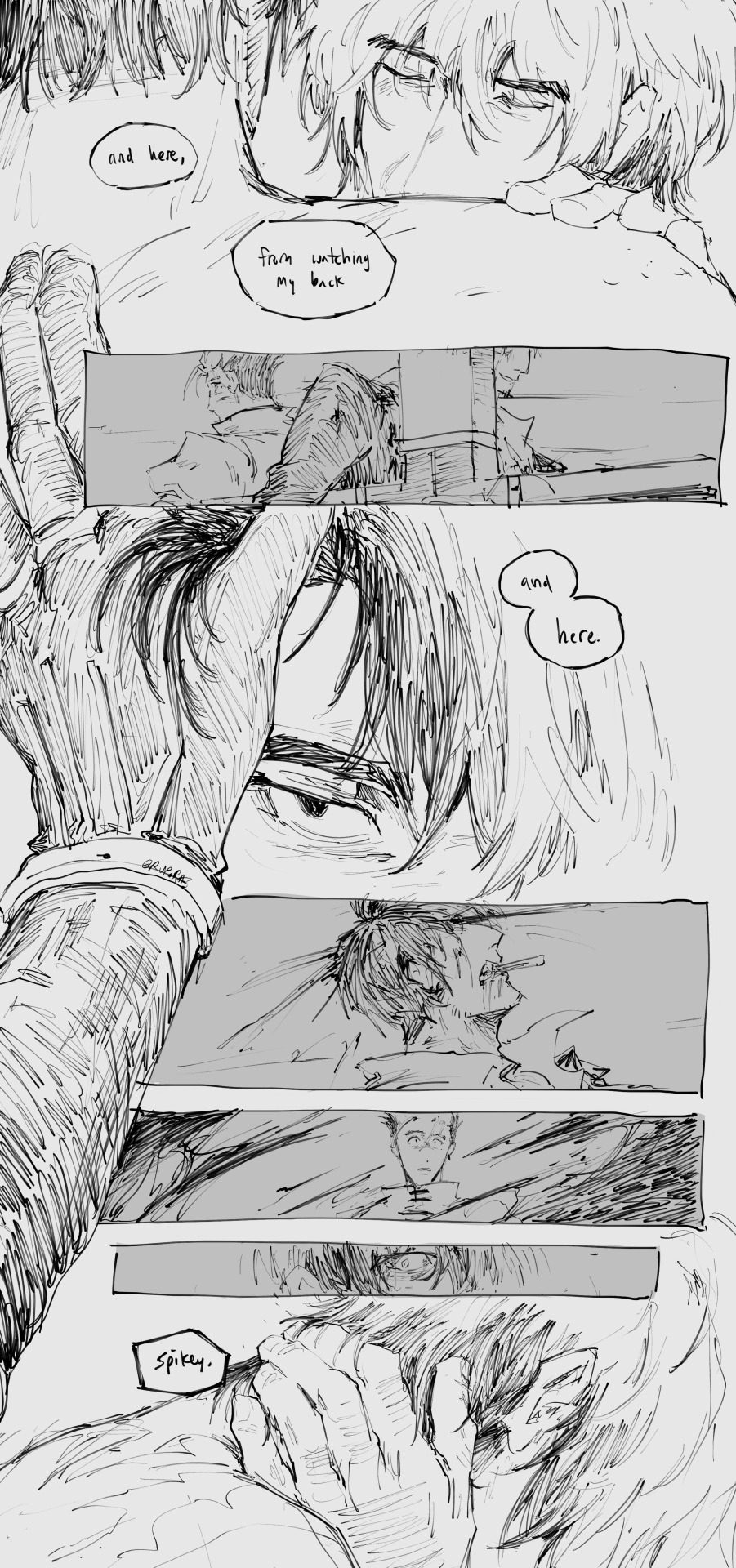


invisible scars (referenced previous talk here)
[ID: A colourless, digital Trigun comic of Vash and Wolfwood talking about Wolfwood's scars. They're both laying in bed and topless. Vash lays on top of Wolfwood, playing with the rosary around his neck. Then, Vash kisses a spot on Wolfwood's chest. Wolfwood asks, "What are you doing?" Vash smiles sadly, "You got shot here. In the last town we visited. You didn't even bother moving."
Vash props himself up over Wolfwood, who frowns slightly. Wolfwood is quiet for a moment before he says, "You remember that, huh?" Vash grabs Wolfwood's left wrist and brings it to his face. "And here." He kisses another spot there. "When you helped free the hostages from that robber..." Wolfwood dismissively says, looking away, "Was a lucky shot." Vash huffs, “Don’t brag. Jeez.”
Half of Wolfwood's expression is shown, eyes returning to Vash who is now sitting up, continuing to say, "And..." Vash goes on and kiss Wolfwood's right palm. "You got cut here, even though that girl was aiming at me." A moment from the past flashes, of Wolfwood grabbing a knife aimed at Vash, his hand bleeding.
At present, Vash moves down and puts another kiss on Wolfwood's right shoulder. "And here, from watching my back." Another memory flashes of Wolfwood and Vash back to back. Vash looks back as Wolfwood grins while holding Punisher, bleeding from multiple gunshots in his shoulder.
"And," Vash combs up Wolfwood's hair to reveal his forehead, "Here." A final memory shows Wolfwood with a regeneration vial in his mouth while getting shot on his temple. The next panel is framed in blood with Vash at the center, eyes wide and stunned in horror. The next panel is a closed up shot of Wolfwood's eye, locked on Vash's face.
Back to present, Vash’s head is bowed down as Wolfwood raises a hand to his nape and says, “Spikey.”
Wolfwood looks serious and frowns as he says, "We talked about this. Those were my decisions. They're not there anymore. Forget about them." Vash looks very sad before he smiles ruefully and says, "I still see them. All the time." He leans down so they touch foreheads. Wolfwood’s sorrowful expression can be seen as Vash says, "You protect so much. I could never forget what you've done to me. And many others..."
In the last image, they're drawn more cartoonishly. Wolfwood sweats and asks, "You don't actually remember every wound, right?" Vash points at a spot on his chest. "Kuroneko left a scratch here 7 times." Wolfwood, startled, says, "Why the hell are you keeping count—" End ID]
Credits for ID here and here
#vashwood#vash the stampede#nicholas d wolfwood#trigun#trigun maximum#another scars comic for one of the vw week days!!!! frankly i think about their scars WAY too often . most notably wolfwood's because#it really symbolizes a lot for him imo bc for vash it's a history of all the people that's ever harmed him betrayed him and the trust he has#given to humanity despite it all. its a beautiful reflection of his character and then u look at ww and presumably#since we dont really see him half naked Ever (shame) and i mean. i guess technically its a hc -- i assume he wouldn't have any scars bc#of the regen potions (which is why he doesnt have his t scars btw the regen pot took them away :pensive:)#in a way its like washing his hands of blood. giving him the body of someone who might never been involved in a fight never held a gun#but he knows thats not true yet he cant really do anything about it anyway bc he's still just human. if he stops taking the regen pots#he can't press forward. so its just a rinse and repeat and growing accustomed to whats inflicted on him because he knows it'll go away at#the end of the day. he's human but he's also not he's far beyond what could be considered a normal human but he still just is.#mortal but also not immortal. idk. i overthink about it a lot GMSKGMDK frankly i dont think it matters THAT much in the context of trimax#but it means a lot to me somehow. also thinking about how no matter how many times ww kills he's never numb to the sensation of it. maybe#the adrenaline gets to him for the beginning half but ive been rereading like.. vol 3? and that entire fight for ww#u can slowly see him spiral as he keeps on going on. anyway anyway. i love ww#ruporas art
4K notes
·
View notes
Text
Tired Ghost
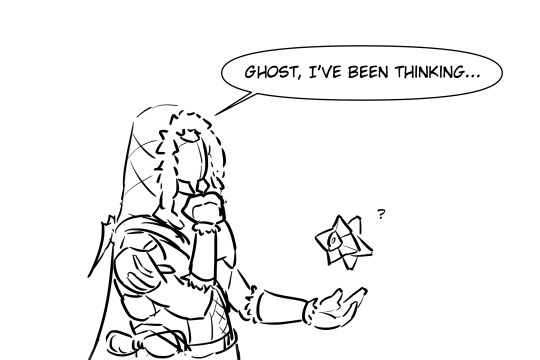
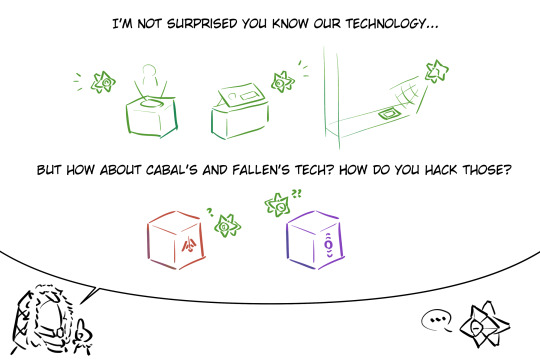
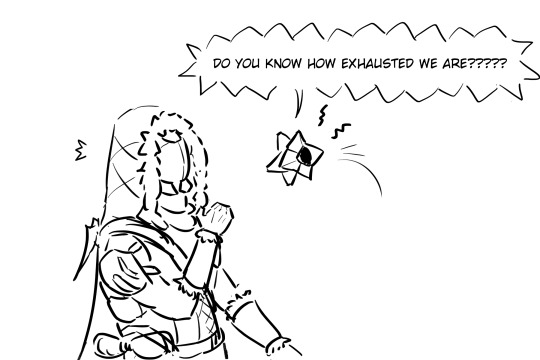
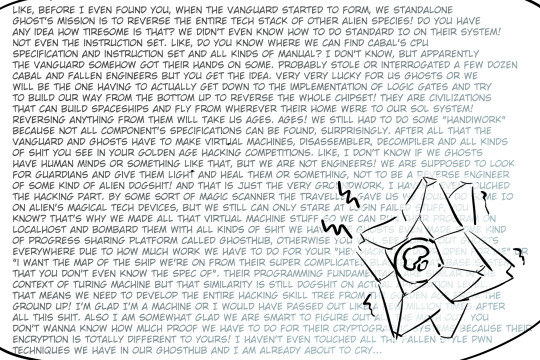
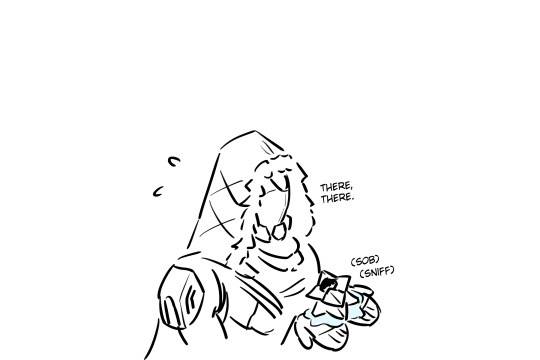
#i don't wanna spend too much time on this#(wrote an essay about how i thought vanguard hacking kit was developed)#yep that's not lorem ipsum#i just wanna see ghost complaining don't judge me too much#i didn't take history class in the ishtar collective (TM) those are all ooc don't actually read into that#if you actually know what im saying then you'd know i probably failed my computer security lesson#also the traveller probably gave them similar tech so their physical architecture should be similar#also ur a nerd lol#destiny 2#destiny hunter#destiny ghost#destiny 2 art#my art
611 notes
·
View notes
Text
there's something i need to say and yall can boo me for it but deep in my heart i'll always know i'm correct: crowley already forgave aziraphale. like already would take him back at one flutter of his eyelashes. that's all.
#do i wish he wouldn't forgive so easily (tho i don't actually think aziraphale needs forgiveness since he didn't do anything wrong and#actually without his decision their love story would've been stuck as it was for more than 6000 years and also heaven would never change#without someone dismantling it and making it new)#yes i do wish that and i also wish he'd learn self worth but we gotta be realistic here he never once been able to stay mad at aziraphale#all those times they had fights where aziraphale was (mostly) in the wrong and rejected crowley what did crowley do? immediately come#CRAWLING and BEGGING back like pls yall this is why i don't read post s2 fics bc everyone suddenly seems to forget their whole canon#personalities and history w each other and it's annoying me so much like i get that we all are hoping crowley learns from his mistakes and#stops being so easy for aziraphale (not me tho) but realistically speaking it's just not gonna happen and once again aziraphale DIDN'T. DO.#ANYTHING. WRONG. yes he hurt crowley with his decision but CROWLEY HURT HIM WITH HIS TOO so if yall wants an apology dance it's gonna turn#into a waltz cause they'd both need to do it#good omens#good omens s2#azicrow#crowley#aziraphale#aziracrow#ineffable spouses#good omens season 2#ineffable husbands#go s2
673 notes
·
View notes
Text
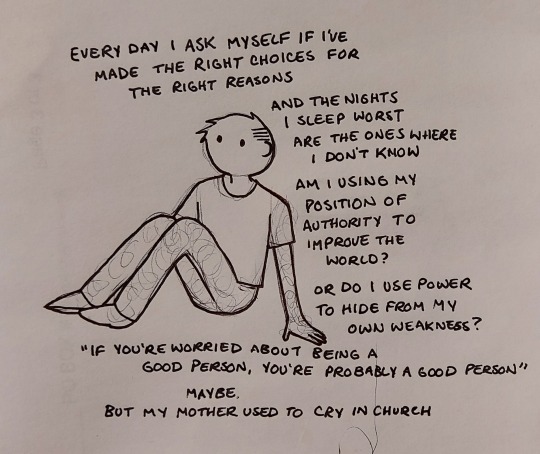
(I'm a security guard.)
#There is an overwhelming number of traumatized people who work in security#So many of us have histories of abuse#Or other things#And I wonder so often#I'm good at my job#But am I attracted to power?#I like helping people#I don't like hurting people#Or picking on anyone#But it's hard to know what the right answers are sometimes#Part of my job is working with police#Even if I disagree with them#I tell myself it's better that I'm the guard here#And not someone malicious#Or cruel#But how much am I really changing?#And am I using my power correctly#Or will I become the unreasonable authority that made me the scared person I am#Is it already too late?#What if the calls I'm unsure of are the warning signs#Maybe I'm already too late#Maybe my sense of morality and justice is eroding#To fit the hole I've placed myself in#Maybe I'm not chipping at the walls fast enough#Maybe I'm being reshaped#Just being here#Maybe my conflict of conscience is the internal monologue of a sympathetic villain#Maybe I'm the bad guy
726 notes
·
View notes
Text

"Alex and I love each other deeply. And we are committed to each other deeply." ✨
#first prince#alex x henry#henry x alex#rwrb#rwrb movie#red white and royal blue movie#rwrb fanart#red white and royal blue#alex claremont diaz#henry fox mountchristen windsor#prince henry#history huh?#firstprince fanart#first prince fanart#chibi art#my art#i'm obsessed with them#do i draw them too much ?#probably.#am i going to stop ?#not anytime soon
592 notes
·
View notes
Text
its actually so insane how cute ive gotten just on 9 months of hrt and growing out my hair. i always figure i kinda just look the same as i did like a year or two ago but then i actually look at old pictures and i look at myself in the mirror and its like a whole different person. like there really are chemicals that have been inside me for months and theyre having an effect and. well im just so happy
#sometimes i feel like i talk too much about my transition but Well its kind of the most important thing thats ever happened in human history#to me
855 notes
·
View notes
Text
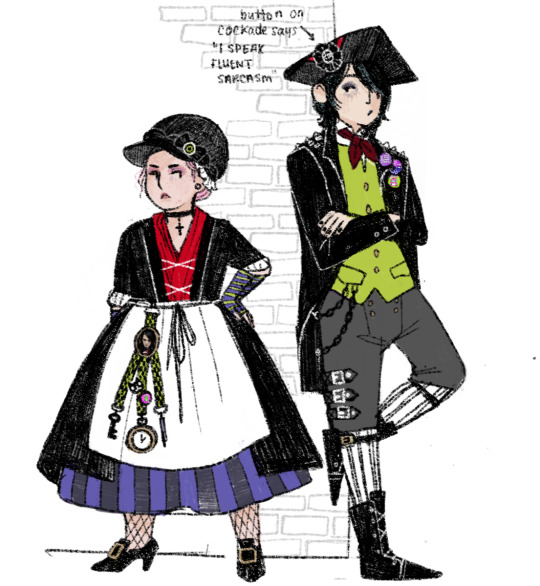
Providence Place Mall Hot Topic circa 1770
#my art#digital art#history#emo#mall goth#i put too much effort into designing these looks... this was the only thing i thought about all day#the chatelaine/lanyard nightmare object was the first idea and everything else spun out of it
1K notes
·
View notes
Note
Building up on both of does anon posts, Machete and Vasco being historical figures that make waves every so often on tumblr feels very canon and not too far from actual tumblr's favourite historical figures.
And also, I feel that Machete shouldn't go that unnoticed by scholars. Being this powerful member of the clergy that escaped many assassination attempts before being killed and had a personal relationship with the pope. Like this man was a deathly and important part of the inquisition, but also left behind rumours of a same-sex relationship with a married politician.
I can definitely see him becoming a point of interest for some historians, especially does who studied the inquisition or the clergy. That's probably how Vasco's paintings of him got discovered and documented and how their relationship stopping being considered a rumour started by his now-death enemies, but an actual theory with some weight behind it.
Idk why but I'm becoming very invested in the ways history would treat and remember them, way too many scandals and drama for them to be forgotten in time.
You do make a very convincing point.
People are getting so invested in their hypothetical in-universe reputation and are clearly putting some serious thought into it and it's getting me hyped up as well ;_;
#answered#anonymous#Vaschete scenarios#the fact that the modern au takes place on the same timeline and works as sort of a reincarnation situation kind of complicates things#I'd either have to figure out how to keep the present day iterations from ever learning too much about their 'previous selves'#which can be a little tricky since history is something they're interested in#or tone down the resemblance and similarities enough that they could pass as a weird but plausible coincidence#I'm probably thinking about this too hard it doesn't matter that much
213 notes
·
View notes
Note
Hi, i just learned about the scientific revolution in europe at school. Can you tell me why you dont think scientific revolutions exist? im curious!
So I feel like I have to lead with the fact that I'm kind of arguing two different points when I say scientific revolutions aren't really a thing
One is that I'm objecting to a specific, extremely foundational theory of scientific revolutions that was put forth by the philosopher Thomas Kuhn, which I think really misrepresents how science is actually practiced in the name of fitting things to a nice model. The other is that I think the fundamental problem with the idea is that it's too vague to effectively describe an actual process that happens.
It's certainly true that there are important advances in science that get referred to as "revolutions" that fundamentally changed their fields -- the shift from the Ptolemaic model of the Solar System to the Copernican one, Darwin's theory of evolution, etc. But there are historians of science (who I tend to agree with) that feel that terming these advances "revolutions" ignores the fact that science is an continuous, accretional process, and somewhat sensationalizes the process of scientific change in the name of celebrating particular scientists or theories over others.
Kuhn's model that he put forth in The Structure of Scientific Revolutions (which is one of those books that itself stirred a great deal of activity in a number of fields) suggests science evolves via what he called "paradigm shifts," where new ideas become fundamentally incompatible with the old model or way of doing things, causing a total overturn in the way scientists see the world, and establishing a new paradigm -- which will eventually cave to another when it, too, ceases to function effectively as a model. This theory became extraordinarily popular when it was published, but it's somewhat telling who it's remained popular with. Economists, political scientists, and literary theorists still use Kuhn, but historians of science, in my experience at least, see his work as historically significant but incompatible with how history is actually studied.
Kuhn posits that between paradigm shifts there are periods of "normal science" where paradigms are unquestioned and anomalies in the current model are largely ignored, until they reach a critical mass and cause a scientific revolution. In reality though, there is often real discussion of those anomalies, and I think the scientific process is not nearly so content to ignore them as Kuhn thinks. Throughout history, we see people expressing a real discontent with unsolved mysteries the current scientific model fails to explain, and glossing over those simply because the individuals in question didn't manage to formulate breakthrough theories to "solve" those problems props up the somewhat infamous "great men" model of history of science, where we focus only on the most famous people in the field as significant instead of acknowledging that science is a social enterprise and no research happens in a vacuum!
Beyond disagreeing with Kuhn specifically though, I think the idea of scientific revolutions vastly simplifies how science evolves and changes, and is ultimately a really ahistorical way of thinking about shifts in thinking. Take the example of the shift from Ptolemaic, geocentric thought to the heliocentric Copernican model of the solar system. When does this supposed "revolution" in thought actually start, and when does it "end" by becoming firmly established? You could argue that the publication of Copernicus' De revolutionibus orbium coelestium in 1543 was the beginning of the shift in thinking -- but of course, then you have the problem of asking where Copernicus' ideas came from in the first place.
The "great men" model of history would suggest Copernicus was a uniquely talented individual who managed to suggest something no one else had ever put forth, but realistically, he was influenced by the scientists who came before him, just like anyone else. There were real objections to the Ptolemaic model during the medieval era! One of the most famous problems in medieval astronomy was the fact that assuming a geocentric model makes the behavior of the planets seem really weird to an observer on Earth, referred to as retrograde motion, which had to be solved with a complicated system of epicycles that people knew wasn't quite working, even if they weren't able to put together exactly why. There were even ancient Greek astronomers who suggested that the sun was at the center of the solar system, going all the way back to Aristarchus of Samos who lived from around 310-230 BCE!
Putting an end point to the Copernican revolution poses similar challenges. Some people opt to suggest that what Copernicus started, either Galileo or Newton finished (which in and of itself means the "revolution" lasted around 100-150 years), but are we defining the shift in terms of new theories, or the consensus of the scientific community? The latter is much harder to pinpoint, and in my opinion as an aspiring historian of science, also much more important. Again, science doesn't happen in a vacuum. Copernicus, Galileo, and Newton may be more famous than their peers, but that doesn't mean the rest of the Renaissance scientific community didn't matter.
Ultimately it's a matter of simple models like Kuhn's (or other definitions of scientific revolutions) being insufficient to explain the complexity of history. Both because science is a complex endeavor, and because it isn't independent from the rest of history. Sure, it's genuinely amazing to consider that Copernicus' De revolutionibus orbium coelestium and the anatomist Andreas Vesalius' similarly influential De humani corporis fabrica were published the same year, and it says something about the intellectual climate of the time. But does it say something about science only, or is it also worth remembering that the introduction of typographic printing a century prior drastically changed how scientists communicated and whose ideas stuck and were remembered? On a similar note, we credit Darwin with suggesting the theory of evolution (and I could write a similarly long response just on the many, many influences in geology and biology both that went into his formulation of said theory), but what does it say that Alfred Russel Wallace independently came up with the theory of natural selection around the same time? Is it sheer coincidence, or does it have more to do with conversations that were already happening in the scientific community both men belonged to that predated the publication of the Origin?
I think that the concept of scientific revolutions is an important part of the history of the history of science, and has its place when talking about how we conceive of certain periods of history. But I'm a skeptic of it being a particularly accurate model, largely on the grounds of objecting to the "great men" model of history and the idea that shifts in thinking can be boiled down to a few important names and dates.
There's a famous Isaac Newton quote (which, fittingly, did not originate with Newton himself, but can be traced back even further to several medieval thinkers) in which he states "If I have seen further it is by standing on the shoulders of Giants." I would argue that science, as an endeavor, is far more like standing on the shoulder of several hundred thousand other people in a trenchcoat. This social element of research is exactly why it's so hard to pull apart any one particular revolution, even when fairly revolutionary theories change the direction of the research that's happening. Ideas belong to a long evolutionary chain, and even if it occasionally goes through periods of punctuated equilibrium, dividing that history into periods of revolution and stagnancy ignores the rich scientific tradition of the "in-between" periods, and the contributions of scientists who never became famous for their work.
#SORRY FOR WRITING A NOVEL#i hope this makes sense and that i am not too deep in the history of science theory to give a good explanation#a much shorter tl;dr answer would be that my stance towards scientific revolutions is more skepticism than total rejection#but hyperbole gets the job done a lot faster haha#getting to the point that i really should have a#history of science tag
364 notes
·
View notes